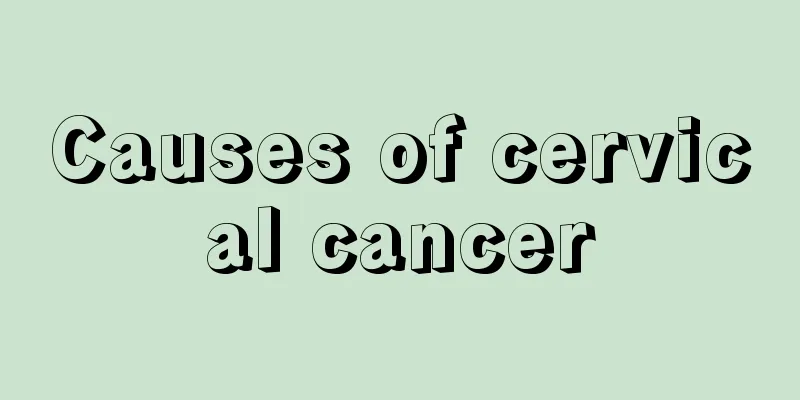Causes of cervical cancer

|
The occurrence of cervical cancer is usually related to genetic, environmental and physiological factors. Its main cause includes persistent infection with human papillomavirus (HPV), which is the most clear and common pathogenic factor. Genetic factors and the strength of the immune system also affect the occurrence and development of the disease to a certain extent. Human papillomavirus (HPV) infection is considered the most important external trigger for cervical cancer. Most sexually active women may be infected with HPV at some stage, and factors such as underage sex, multiple sexual partners, and failure to practice safe sex can increase the risk of infection. Although HPV infection is very common, not all infected people will develop cervical cancer. Only persistent infection with high-risk HPV will lead to cancer. Genetic and immune factors play a supporting role in the development of cervical cancer. Studies have shown that certain genotypes may make women more susceptible to the carcinogenic effects of HPV. People with weakened immune systems (such as those infected with HIV or those taking immunosuppressive drugs for a long time) also face a higher risk of cervical cancer. Other related factors include smoking, long-term use of oral contraceptives, etc., which may increase the risk of cervical cancer by weakening the immune system or causing abnormal cell changes. Human papillomavirus (HPV) infection is considered the most important external trigger for cervical cancer. Most sexually active women may be infected with HPV at some stage, and factors such as underage sex, multiple sexual partners, and failure to practice safe sex can increase the risk of infection. Although HPV infection is very common, not all infected people will develop cervical cancer. Only persistent infection with high-risk HPV will lead to cancer. Genetic and immune factors play a supporting role in the development of cervical cancer. Studies have shown that certain genotypes may make women more susceptible to the carcinogenic effects of HPV. People with weakened immune systems (such as those infected with HIV or those taking immunosuppressive drugs for a long time) also face a higher risk of cervical cancer. Other related factors include smoking, long-term use of oral contraceptives, etc., which may increase the risk of cervical cancer by weakening the immune system or causing abnormal cell changes. In order to effectively prevent cervical cancer, it is recommended to pay attention to the following points: regular cervical screening (such as Pap smear or HPV test) is an important means of early detection of potential precancerous lesions, especially for women over 30 years old; HPV vaccination can significantly reduce the incidence of cervical cancer, and it is usually recommended to be vaccinated between the ages of 12-26 to obtain the greatest benefit before sexual activity; maintaining a healthy lifestyle, avoiding premature or unsafe sexual behavior as much as possible, reducing tobacco and alcohol intake, strengthening physical exercise, and improving immunity can all help reduce the risk of cervical cancer. If abnormal bleeding, long-term pelvic pain or other suspicious symptoms occur, you should seek medical attention in time to get professional medical advice and treatment. |
<<: Are the early symptoms of colon cancer obvious?
>>: Symptoms of thyroid cancer invading the throat
Recommend
What are the foods that regulate qi and blood?
When the Qi and blood are weak, it will affect a ...
Diet and daily life of patients with gallbladder cancer
In the past, gallbladder cancer was rare, but now...
Why does my shoulder joint hurt when I do bench press in the gym?
In recent years, people are more and more fond of...
What is an easy way to cut mango?
Mango is a tropical fruit that is rich in various...
What is better to eat for Yin deficiency and kidney deficiency?
Kidney deficiency is a common disease in life. It...
Chive flower storage
Chive flowers have many uses. Not only do they lo...
Basic knowledge of facial feng shui
Feng Shui is a relatively mysterious theory in Ch...
What are some tips for preventing scars from oil burns on the face?
Usually after being scalded by oil, if you don’t ...
What are the early symptoms of laryngeal cancer
What are the early symptoms of laryngeal cancer? ...
What is dipeptidyl peptidase 4 inhibitor?
Dipeptidyl peptidase 4 inhibitors are a relativel...
How do adolescent girls wear bras to protect their breasts?
When girls reach puberty, multiple organs in thei...
What are the complications of interventional treatment for liver cancer? Five major complications after interventional treatment for liver cancer
Interventional treatment of liver cancer is to in...
How to take care of patients with fibroids
In many cases, we may develop fibroids due to var...
Can a three-year-old drink pure milk?
Three years old is a critical period for a child&...
Rib hyperplasia and local bulging
Bone hyperplasia is a symptom of human bone aging...









